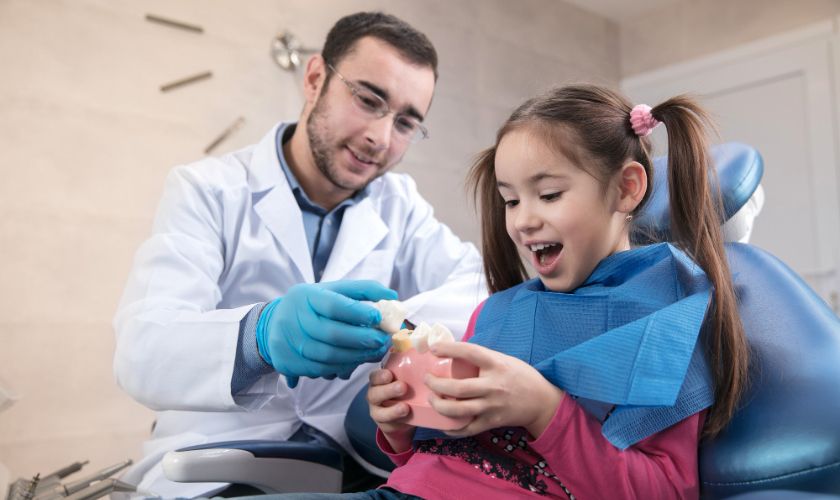Published on July 18, 2023

Welcome to the world of pediatric dentistry, where dental visits become an exciting adventure for kids. With the playful dentist by their side, children can embark on a journey of oral health while enjoying a fun and positive experience. The playful dentist understands the unique needs and fears of young patients, creating a welcoming and cheerful environment that helps alleviate anxiety. Through gentle care, engaging activities, and age-appropriate techniques, the playful dentist instills good oral hygiene habits and educates children about the importance of dental health. Get ready for a dental visit like no other, where smiles, laughter, and happy memories are created along the way.
Understanding Pediatric Dentistry
Pediatric dentistry is a specialized branch of dentistry that focuses on the oral health of infants, children, and adolescents. It involves providing comprehensive dental care in a child-friendly and comfortable environment. Pediatric dentists undergo additional training to understand the unique dental needs and behaviors of young patients. They emphasize preventive care, early intervention, and education to promote lifelong oral health. Pediatric dentistry encompasses a range of services, including routine dental exams, cleanings, fluoride treatments, dental sealants, and orthodontic evaluations. By addressing dental issues at an early stage and making dental visits enjoyable, pediatric dentistry plays a crucial role in laying the foundation for a lifetime of healthy
Importance of Pediatric Dentistry
1. Early Detection and Prevention: Pediatric dentistry focuses on the early detection and prevention of dental issues in children. Regular check-ups and cleanings help identify any potential problems early on, allowing for prompt treatment and prevention of more serious issues.
2. Dental Health Education: Pediatric dentists play a crucial role in educating children and their parents about proper oral hygiene practices. They teach children the importance of brushing, flossing, and maintaining good dental habits to prevent cavities and promote lifelong oral health.
3. Establishing Positive Dental Experiences: Pediatric dentistry aims to create positive experiences for children, helping them develop a healthy attitude towards dental care. By providing a comfortable and friendly environment, pediatric dentists help alleviate dental anxiety and make dental visits enjoyable, setting the foundation for a lifetime of positive dental experiences.
Specialized Pediatric Dental Treatments
1. Fluoride Treatments: Pediatric dentistry often includes specialized treatments such as fluoride application. Fluoride helps strengthen the enamel of the teeth, making them more resistant to decay. This treatment is especially important for children who may have a higher risk of cavities.
2. Dental Sealants: Dental sealants are thin protective coatings that are applied to the chewing surfaces of the back teeth. They act as a barrier, preventing food particles and bacteria from getting trapped in the deep grooves of the teeth, reducing the risk of cavities. Dental sealants are commonly used in pediatric dentistry to provide added protection for children’s vulnerable teeth.
Parents Involvement and Home Care
1. Parental Involvement: Pediatric dentistry emphasizes the importance of parental involvement in children’s oral health. Parents play a crucial role in establishing good dental habits, such as regular brushing and flossing, as well as maintaining a healthy diet. They can also accompany their children to dental appointments and actively participate in discussions with the pediatric dentist.
2. Home Care Tips: Pediatric dentistry provides parents with valuable home care tips to ensure optimal oral health for their children. These may include proper brushing and flossing techniques, guidance on age-appropriate oral hygiene products, and tips for managing common dental issues in children, such as teething or thumb sucking. By following these home care tips, parents can contribute to their children’s overall dental well-being.
Source : UIC College of Dentistry
In conclusion, pediatric dentistry plays a vital role in ensuring the oral health and well-being of children. By creating a playful and welcoming environment, pediatric dentists make dental visits enjoyable and help children develop positive dental habits. The specialized treatments, preventive care, and parental involvement offered in pediatric dentistry contribute to the long-term dental health of children, setting them on a path towards a lifetime of healthy smiles.
Common FAQs about Pediatric Dentistry
1. At what age should I take my child to their first dental visit?
Pediatric dentists recommend that children visit the dentist by their first birthday or within six months of their first tooth erupting. Early dental visits help establish a foundation for good oral health and allow the dentist to monitor the child’s dental development.
2. How often should my child visit the dentist?
Regular dental visits are typically recommended every six months for children. However, the frequency may vary based on the child’s oral health needs and the dentist’s recommendation. Some children may require more frequent visits if they have specific dental issues.
3. Are dental X-rays safe for children?
Dental X-rays are generally safe for children. Pediatric dentists use X-rays to evaluate dental health, detect any underlying issues, and monitor the development of permanent teeth. They take necessary precautions to minimize radiation exposure, such as using lead aprons and high-speed X-ray film.
4. What can I do to prepare my child for a dental visit?
To prepare your child for a dental visit, you can explain what to expect in simple and positive terms. Reading children’s books about dental visits or role-playing can help familiarize them with the experience. It’s important to maintain a positive attitude and reassure your child that the dentist is there to help keep their teeth healthy.
5. What if my child is anxious or fearful about visiting the dentist?
Pediatric dentists are experienced in handling children’s dental anxiety and fear. They create a friendly and welcoming environment to help alleviate anxiety. Techniques such as distraction, positive reinforcement, and nitrous oxide (laughing gas) may be used to help children feel more comfortable during dental procedures. Communication between parents, children, and the dental team is crucial in addressing any concerns or fears.
